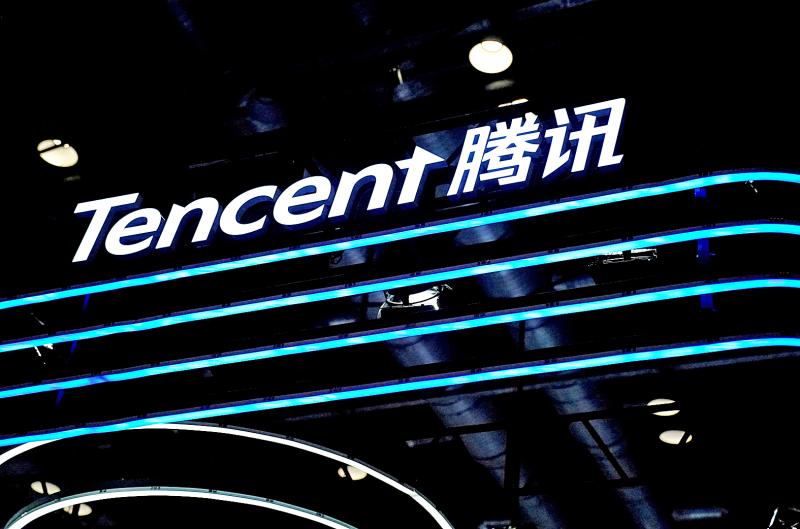Prosus NV is planning to sell more of its US$134 billion stake in Chinese Internet giant Tencent Holdings Ltd (騰訊) to finance a buyback program, reversing a pledge to hold on to the full shareholding despite regulatory uncertainty.
Tencent yesterday erased earlier gains in Hong Kong as investors pondered the extent to which Prosus, the Chinese company’s biggest shareholder, will unload its stock. The shares fell as much as 2.5 percent and closed 1.56 percent lower.
“We will keep selling Tencent shares to buy back our own shares,” Prosus chief executive officer Bob Van Dijk said in an interview. “It’s actually a small part of Tencent daily traded volumes — it should be maximum between 3 to 5 percent.”

Photo: Reuters
The move represents a change of heart by Dutch e-commerce giant Prosus — majority owned by South Africa’s Naspers Ltd — which said after its last sale in April last year that it would not offload more shares for three years.
The company, spun off from Naspers in 2019, owns the 29 percent stake after its parent became an early Tencent investor more than two decades ago, bagging a multibillion-dollar return in one of the most profitable early bets in tech investment history.
Prosus shares soared 12 percent in early trade in Amsterdam, the most since March, while Naspers gained as much as 16 percent in Johannesburg.
Prosus disclosed the plan on the same day as it reported the sale of almost US$4 billion of stock in e-commerce giant JD.com Inc (京東), received from Tencent as a special dividend.
The twin deals revive concerns around the long-term viability of holding shares in Chinese Internet firms, which are only just emerging from more than a year of unprecedented scrutiny from Beijing.
While Prosus’ investment remains wildly in the money, they are selling after Tencent shed roughly half its value since a peak last year, hammered by the government’s campaign to curb the power of its largest Internet corporations.
Prosus said it would manage the sale of Tencent stock in an orderly fashion.
Prosus aims to focus on increasing the value of non-Tencent assets, Van Dijk said, while retaining exposure to the Chinese company. The group is also looking for buyers for Russian classified ads business Avito following the sanctions imposed on the country after the invasion of Ukraine.
Tencent said in a separate statement it supported its shareholders’ decision and expects limited impact on the Chinese social giant itself.
“People are concerned about the upcoming selling pressure on the stock especially after it rebounded to nearly HK$400 recently,” Steven Leung (梁偉源), executive director at UOB Kay Hian Ltd (大華繼顯控股), said by telephone. “It has clouded the share outlook in the near term for sure.”

Merida Industry Co (美利達) has seen signs of recovery in the US and European markets this year, as customers are gradually depleting their inventories, the bicycle maker told shareholders yesterday. Given robust growth in new orders at its Taiwanese factory, coupled with its subsidiaries’ improving performance, Merida said it remains confident about the bicycle market’s prospects and expects steady growth in its core business this year. CAUTION ON CHINA However, the company must handle the Chinese market with great caution, as sales of road bikes there have declined significantly, affecting its revenue and profitability, Merida said in a statement, adding that it would

MARKET LEADERSHIP: Investors are flocking to Nvidia, drawn by the company’s long-term fundamntals, dominant position in the AI sector, and pricing and margin power Two years after Nvidia Corp made history by becoming the first chipmaker to achieve a US$1 trillion market capitalization, an even more remarkable milestone is within its grasp: becoming the first company to reach US$4 trillion. After the emergence of China’s DeepSeek (深度求索) sent the stock plunging earlier this year and stoked concerns that outlays on artificial intelligence (AI) infrastructure were set to slow, Nvidia shares have rallied back to a record. The company’s biggest customers remain full steam ahead on spending, much of which is flowing to its computing systems. Microsoft Corp, Meta Platforms Inc, Amazon.com Inc and Alphabet Inc are

RISING: Strong exports, and life insurance companies’ efforts to manage currency risks indicates the NT dollar would eventually pass the 29 level, an expert said The New Taiwan dollar yesterday rallied to its strongest in three years amid inflows to the nation’s stock market and broad-based weakness in the US dollar. Exporter sales of the US currency and a repatriation of funds from local asset managers also played a role, said two traders, who asked not to be identified as they were not authorized to speak publicly. State-owned banks were seen buying the greenback yesterday, but only at a moderate scale, the traders said. The local currency gained 0.77 percent, outperforming almost all of its Asian peers, to close at NT$29.165 per US dollar in Taipei trading yesterday. The

The US overtaking China as Taiwan’s top export destination could boost industrial development and wage growth, given the US is a high-income economy, an economist said yesterday. However, Taiwan still needs to diversify its export markets due to the unpredictability of US President Donald Trump’s administration, said Chiou Jiunn-rong (邱俊榮), an economics professor at National Central University. Taiwan’s exports soared to a record US$51.74 billion last month, driven by strong demand for artificial intelligence (AI) products and continued orders, with information and communication technology (ICT) and audio/video products leading all sectors. The US reclaimed its position as Taiwan’s top export market, accounting for